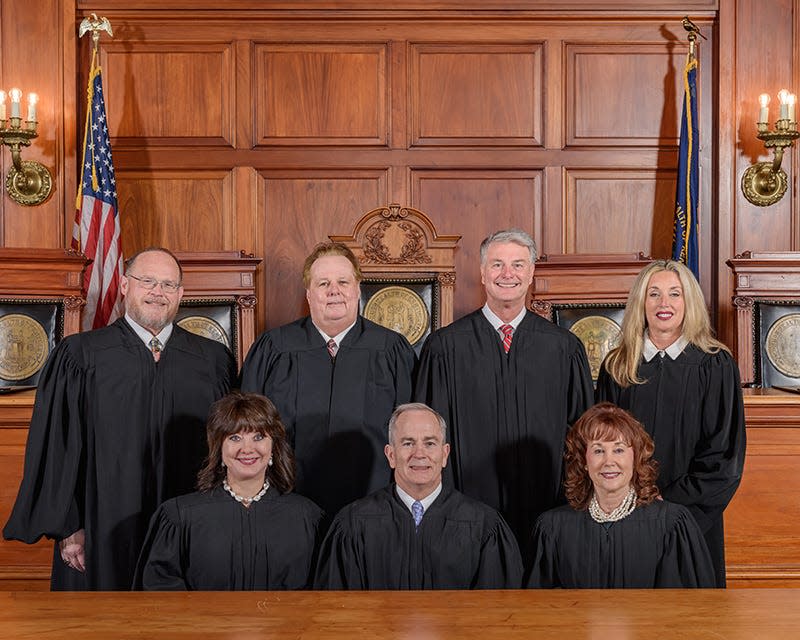Ex-Louisville cop sex abuse lawsuit dismissed by state Supreme Court over time limit

Samantha Killary — a victim of childhood sexual abuse for more than a decade by her adoptive father, then-Louisville Police Officer Sean Jackman — has had her lawsuit against former LMPD officers, who allegedly knew of the abuse and failed to report it, and Louisville Metro, their then-employer, dismissed based on a time-limit technicality.
While 2017 and 2021 state laws in Kentucky now allow abuse victims to bring claims against “non-perpetrators” who could have protected children as well as doubled the time in which people could sue based on these claims, the state Supreme Court has decided that these laws cannot be applied retroactively.
The Supreme Court reaffirmed the initial ruling to dismiss Killary's suit, writing that reviving a time-barred claim has "long conflicted with federal authority" and that the statute of limitations is "a vested right beyond legislative control."
Killary was adopted by Jackman when she was 2 and has said he sexually abused her throughout her childhood, stopping only when she turned 18 in 2009. At the time, he was employed by LMPD and eventually rose to the rank of lieutenant.
After Killary secretly recorded him admitting the abuse and apologizing for it, Jackman pleaded guilty to multiple sex offenses in 2018 and was sentenced to 15 years in prison, which he is still serving.
In 2018, Killary filed a lawsuit against Jackman in addition to former Officer Linda Thompson, whom Jackman dated from 2001 to 2003, and his father, former Detective Sgt. Rick Jackman. She alleged both former officers knew of the abuse and failed to report it, as required by law. Killary also filed to sue Louisville Metro, for employing and empowering them.
Jefferson Circuit Judge McKay Chauvin dismissed all the defendants, saying they were protected by a statute of limitations that at the time gave people alleging child sexual abuse only five years to sue — and which had long expired.
But a few changes in state law had cast doubt over this ruling.
In 2017, the state legislature doubled the time period in which people could sue, citing concerns over Kentucky’s status leading the nation in substantiated child abuse reports per capita. Later, in 2021, state lawmakers said claims could be brought against “non-perpetrators” such as police, government units or religious organizations that violated their duties to children.
Based on these laws, the Court of Appeals reinstated Killary’s suit. The defendants except for Jackman appealed the decision, leading this case to the docket of the state Supreme Court.
The state justices were asked to decide whether the legislature’s expansions of the child abuse law should be applied retroactively to alleged abuse cases before the law had been changed.
The Court of Appeals found that Jackman's 2018 conviction is considered a triggering event under state law that would make him eligible to be sued as the perpetrator. Sean Jackman did not appeal the appellate court's decision, so the state Supreme Court did not weigh on his eligibility.
The seven justices in the state Supreme Court concurred with all or part of its ruling, though they were split on how and why the eventual conclusion was made.
While Justice Angela McCormick Bisig wrote she agreed with the majority of the court's ruling, such as the suit against Louisville Metro being dismissed, she argued the state legislature did not deprive Rick Jackman and Thompson of their vested right to a statute of limitations defense and the matter should be remanded to the circuit court for consideration of the claims.
"(T)oday’s decision again gives a windfall to the perpetrators and enablers of childhood sexual abuse, who once more reap the wholly unjust benefit of avoiding liability on the legal technicality of an expired statute of limitations," Bisig wrote.
Reach reporter Rachel Smith at rksmith@courierjournal.com or @RachelSmithNews on X, formerly known as Twitter.
This article originally appeared on Louisville Courier Journal: Kentucky Supreme Court rules on child sex abuse lawsuit eligibility

